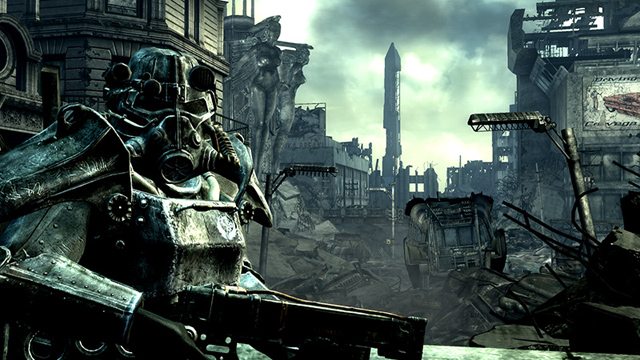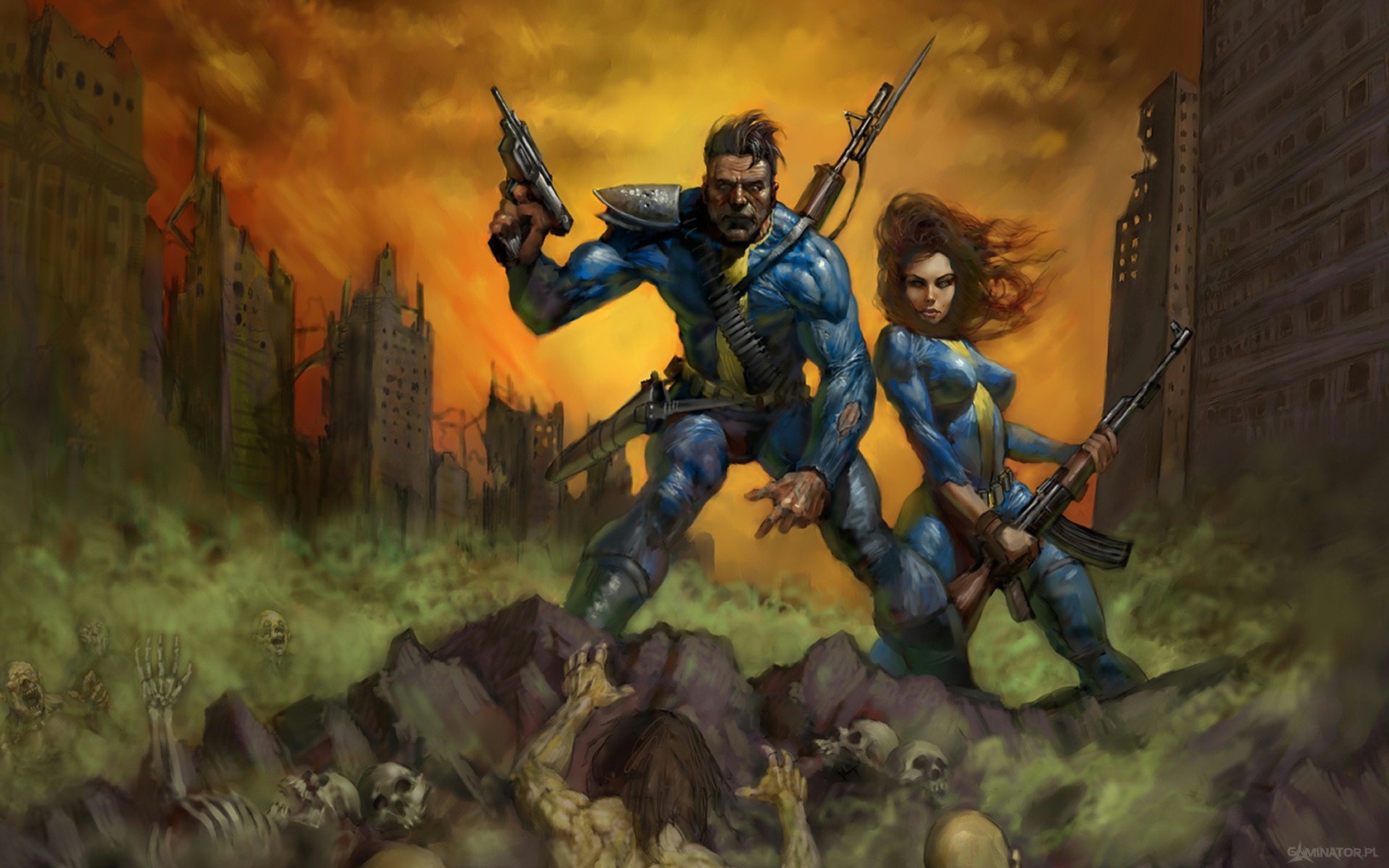Why Fallout is the best story about nuclear war

I wandered through the wastelands in a desperate search for the water chip needed to fix the car and save my own. I spent countless hours in the Californian deserts, looking for a “set to create the Garden of Eden” to feed the hungry.
I was looking for a way to sprinkle the life-giving water of the District of Columbia desert, fought with supermutants in subway tunnels, and spent supposedly whole years playing in New Vegas casinos, while Caesar’s Legion fought with the New California Republic.
I know war ... war never changes.
If you get goose bumps from this phrase - from nostalgia, or from joyful excitement, you understand what I'm getting at. The best story about nuclear war was a series of computer games Fallout.
')
Games are big business, and sales of electronic entertainment have been beating books, movies and television for several years now. But besides this, the game is also an art. They have the unique ability to completely immerse the player in a different, fictional world.
Like movies with television, games are a visual means, in which the main role is taken by the vision of the creator. But like books, games create unique, beautiful worlds that incorporate the user's imagination and provide many hours of entertainment.
And like any art, the best games tell us something unusual about people in general and about the culture that created them, in particular. This is exactly what Fallout is doing — a 20-year-old franchise that helped the “MTV generation” understand, ridicule, and control their parents' fears of the Cold War.
Fallout takes place in a post-apocalyptic world, such as the propagandists of the United States Department of Defense in the 1950s represented it. In this world, the grandchildren of the Cold War brought the fears of the previous generation to life and dispelled them, turning them into a playground.

One of the most memorable properties of a franchise is the artistic style and setting. Each game takes place in a radioactive desert about 100 years after the fall of the last nuclear bombs. Society was restored, but it is very difficult to exist in it. Gangsters are attacking peaceful villages, cities are teetering on the brink, and factions with warring ideologies are fighting for control over what remains.
The uniqueness of the action sells his retro-futurism. The history of America, which is different from ours. Culture remained in the 50s, and technology moved far forward, leaving culture behind. Therefore, the deserts of the old world look like a nightmare in the style of googie and are full of creatures, as if descended from the covers of Jack Vance's books.
Squat robots are buzzing, clicking and waving strange limbs. Laser guns look as if they belonged to Tom Swift . On each rocket elegant stabilizers flaunt. The desert is still full of posters with advertisements, drawings and propaganda. A man with a massive jaw grins at a pipe, while a woman carries flip-flops. Little Timmy wears a small round cap with a propeller, and the dog chases a robot around the courtyard of a two-story house in the colonial style. It is sweet, beautiful and nostalgic.
But at the same time, nostalgia masks a grim story - one in which the nightmares of the Cold War turned into destruction. The Fallout universe has a common history with us — right up to the end of the Second World War. And then it all went wrong.
In 1947, in the Fallout universe, Bell's laboratory did not finish the development of transistors and technology miniaturization did not happen. From here both strange robots and the volume weapon.
After the war, America was so frightened by the threat of universal communization that it divided into 13 republics in order to cope with internal political division. Different republics differ from each other enough for everyone to find their niche.
But the opposite happened - the position of divided America weakened on the world stage. Nixon did not visit China, the USSR did not fall apart, and the tensions of the Cold War lasted for a hundred years. Culture stagnated, staying in the kitsch of the 50s.
And then, in 2050, everything fell apart. The Middle East pushed up oil prices, and some countries in Europe were plunged into chaos. An epidemic broke out in America and the government closed the borders. Terrorists detonated an atomic bomb in Tel Aviv.
In the wake of fear of a general nuclear war, Vault-Tec offered its solution to a frightened public: hundreds of sophisticated shelters throughout the country. She proposed a way out of the situation, a new life in a protected shelter, together with like-minded people. With food, water and entertainment - for everyone who could pay for it. Thousands of people moved to shelters.
In 2066, China invaded Alaska to seize oil fields. The war broke out, and someone resorted to launching nuclear missiles - who, exactly, remained unknown. And the bombs destroyed the whole world.
It is in such a radioactive and joyless America that games take place. Usually the player starts the game as one of the inhabitants of the shelter, for several generations separated from the events of war. All that is known to the character is the comfort of the shelter. And then something goes wrong, and the player has to explore the wasteland to solve this problem.
With a superficial glance, the plot seems simple and it is not clear why the game deserved the title of the best story about a nuclear war. To understand this fact, it is necessary to understand my generation. I was born in 1983, and I have only vague memories of the Cold War.
I remember the fall of the Berlin Wall as a kind of TV event over which adults cried. I remember the fall of the USSR in the form of photographs of Muscovites who were crumbling Lenin statues on the front page of the newspaper - just the number that I first tried to seriously read. And I remember how adults sat with such satisfied faces, as if it was they who defeated communism.
The fall of the Wall and the collapse of the USSR were the turning points of world history. They marked the end of an era of fear and anxiety that permeated American culture for 50 years. But then I could not fully understand this. The cold war did not frighten me as much as frightened my parents and their parents.
That's why I love Fallout so much. Games help me understand this fear that was present in the culture in a way that historical or artistic books like “Alas, Babylon” do not help. History gives facts, and Fallout gives sensations.
The generation of the 80s are rather strange people. I cynically looked at the war against radical Islamists. When a detachment of marines destroyed Osama bin Laden, the students joyfully organized flash mobs across the country.
This makes sense - they were children when the twin towers fell, and spent half their lives in a country in a state of war. I have already seen the collapse of one of the major threats - the USSR. And he was cynical.
The first Fallout came out in 1997, when I was 14 years old. And they became something permanent in my gaming life. And in the radioactive deserts stained by a strange American culture that could have been, but did not happen, I found something strange ... and understandable.
The world of Fallout is the same world that my parents feared while sitting in front of the TV. And on TV, aging actors warned the country about the evil that comes from people from another country whom I had never seen.
And these deserts happened only because their history did not develop. The surging 60s and 70s did not come, people clung to the old notions - that’s what killed them. Nostalgia is poison, and Fallout shows how deadly it is.
Among other things, the series is full of dark and strange humor. In New Vegas, the Kings are one of the main bands, which worship Elvis as a saint and imitate him. In Fallout 2, my character, to earn money, starred in adult films. Then he ate a radioactive fruit and grew another toe, after which the director dismissed him.
I laughed at this ridiculous situation. As ridiculous as decades of balancing on the brink of war between rival superpowers, who almost created a world inhabited by vampires, mutants and radioactive porn stars.
Fallout is wonderful because it gave me the opportunity to understand the fears of my parents. Moreover, he gave me permission to laugh at them and a way to control them - in the digital sandbox, undermining the nostalgia for the bygone Cold War.
Source: https://habr.com/ru/post/368837/
All Articles